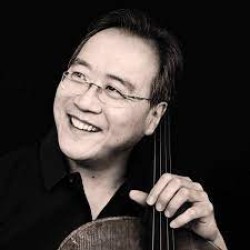
Yo-Yo Ma
American cellist
| Date of Birth | : | 07 Oct, 1955 |
| Place of Birth | : | Paris, France |
| Profession | : | American Cellist |
| Nationality | : | American |
| Social Profiles | : |
Facebook
Twitter
Instagram
|
Yo-Yo Ma is an American cellist. Born and partially raised in Paris to Chinese parents and educated in New York City, he was a child prodigy, performing from the age of four and a half. He graduated from the Juilliard School and Harvard University, attended Columbia University, and has performed as a soloist with orchestras around the world. He has recorded more than 90 albums and received 19 Grammy Awards.In addition to recordings of the standard classical repertoire, Ma has recorded a wide variety of folk music, such as American bluegrass music, traditional Chinese melodies, the tangos of Argentine composer Astor Piazzolla, and Brazilian music. He has also collaborated with artists from a diverse range of genres, including Bobby McFerrin, Carlos Santana, Chris Botti, Diana Krall, James Taylor, Miley Cyrus, and Sting. Ma has been a United Nations Messenger of Peace since 2006. He has received numerous awards, including the Avery Fisher Prize in 1978, The Glenn Gould Prize in 1999, the National Medal of Arts in 2001, the Presidential Medal of Freedom in 2011, Kennedy Center Honors in 2011, the Polar Music Prize in 2012, and the Birgit Nilsson Prize in 2022. He was named as one of Time's 100 Most Influential People of 2020. Ma's primary performance instrument is the Davidov cello, made in 1712 by Antonio Stradivari.
Early life and education
Ma's mother, Marina Lu, was a singer, and his father, Hiao-Tsiun Ma, was a violinist, composer and professor of music at Nanjing National Central University (now relocated in Taoyuan, Taiwan; predecessor of the present-day Nanjing University and Southeast University). They both migrated from the Republic of China to France during the Chinese Civil War. Ma's sister, Yeou-Cheng Ma, played the violin and piano before obtaining a medical degree and becoming a pediatrician. The family moved to New York City when Ma was seven. From the age of three, Ma played the drums, violin, piano, and later viola, but settled on the cello in 1960 at age four. When three-year-old Yo-Yo said he wanted a big instrument, his father went to see Etienne Vatelot, a foremost violin maker in Paris who, after a chat, lent him a 1/16th cello. He jokes that his first choice was the double bass due to its large size, but he compromised and took up the cello instead. When his father realized that Yo-Yo was ready for a better teacher, a well-known cello instructor, Mme Michelle Lepinte, was selected. He began performing before audiences at age five and played for presidents Dwight D. Eisenhower and John F. Kennedy when he was seven. At age eight, he appeared on American television with his sister in an event introduced by Leonard Bernstein. In 1964, Isaac Stern introduced them on The Tonight Show Starring Johnny Carson, and they performed the Sonata of Sammartini. He attended Trinity School in New York but transferred to the Professional Children's School, where he graduated at age 15. He appeared as a soloist with the Harvard Radcliffe Orchestra in a performance of Tchaikovsky's Rococo Variations.
Quotes
Total 25 Quotes
Passion is one great force that unleashes creativity, because if you're passionate about something, then you're more willing to take risks.
When your heart and your mind are engaged, you cannot go wrong.
Music enhances the education of our children by helping them to make connections and broadening the depth with which they think and feel. If we are to hope for a society of culturally literate people, music must be a vital part of our children's education.
Nobody else can make the sound you make.
The worst thing you can do is say to yourself, "I want to be just like somebody else." You have to absorb knowledge from someone else, but ultimately you have to find your own voice.
As you begin to realize that every different type of music, everybody's individual music, has its own rhythm, life, language and heritage, you realize how life changes, and you learn how to be more open and adaptive to what is around us.
When we enlarge our view of the world, we deepen our understanding of our own lives.
I think one of the great things about being a musician is that you never stop learning.
Each day I move toward that which I do not understand. The result is a continuous accidental learning which constantly shapes my life.
Culture opens our hearts to one another. And the currency in culture is not money, but trust.
